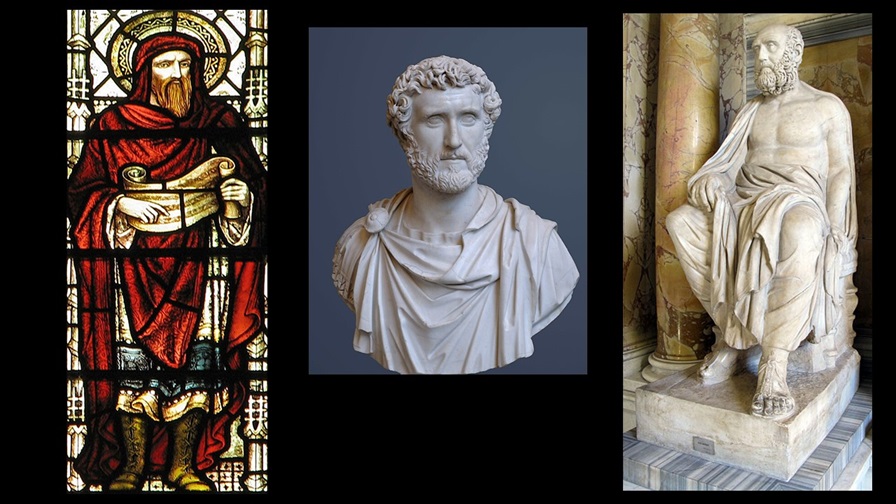.
Apologies at Antoninus Pius’s Table, 155 A.D.
.
I. Rome’s Glory
“Arriving at this feast, how proud I stand
that Rome endures to succor those who dwell
here in this citadel and those whose hands
till soil across the empire that reaps well.”
Sharp Aristides spoke to those who turned
to listen to his speech, and having viewed
the gathered gorging senators, he yearned
for more applause at higher amplitude.
Despite his wish for more, he had to deal
with what he got: a modicum of praise
for his didactic style, the strong appeal
to civic pride, and singular catchphrase.
“The Glory of Rome” to that proper group
was bingeing as before an acting troupe.
.
II. God’s Glory
Responding to this scene with just a smile
at first, another speaker then approached
that satisfied reclining set, and while
he had no guile, these were the words he broached:
“Another Greek of fellow name expressed
to you great men some years ago that those
whom you call gods aren’t real to be addressed
but there is Jah, and his son, Christ, who rose.”
This Justin spoke despite a fleeting fear
of jeers that Athens’ Aristides faced
once in that court and witnessed to his peers,
despite their apathy, about God’s grace.
“Now, I to you may seem some jesting fool,
and yet there’s glory being my God’s tool.”
.
Poet’s Note: There were two Aristides who were contemporaneous. Per records, they both delivered orations in front of the Roman emperor. The first sonnet has the pagan Aelieus Aristides speaking. In the second sonnet, the second Aristides was also a “fellow Greek,” but of Athens, and was a known Christian apologist. He delivered an oration some years prior to Justin Martyr to the same court
.
.
Christopher Fried lives in Richmond, VA and works as an ocean shipping logistics analyst. His poetry collection All Aboard the Timesphere was published in 2013 by Kelsay Books. His novel Whole Lot of Hullabaloo: A Twenty-First Century Campus Phantasmagoria was published in 2020. Recently, he was an advisor on the 1980s science fiction film documentary In Search of Tomorrow (2022). His recent poetry has been published in Shot Glass Journal, Snakeskin, and Sparks of Calliope.















Both poems exhibit excellent rhyming words that are well-conceived and add immensely to the tone of the sonnets. The historical context of the notes really helped me understand what was occurring and when.
Thanks Roy!
Good idea for a pair of sonnets, Christopher, and excellent conclusion to them re-phrasing one of Justin Martyr’s best-known quotes, in which he cites scriptural prophecy to say he and other Christians have turned swords into plowshares. Your first sonnet. “Rome’s Glory,” spoken by Aelius Aristides works up to this, with the pagan Aristides expressing pride in Roman agriculture. Its two middle quatrains about desire for praise are hilarious–so much like what we want for our own poems and what we actually get in response.
One tiny thing should be fixed: Athens’ instead of Athen’s in “God’s Glory,” line 10. Our moderator can do it if you say so.
Another is not necessarily incorrect, but I would much prefer “bingeing” to “binging” in the last line of “Rome’s Glory.” It’s clearer about what you mean, “indulging in a binge.” There is an archaic verb “to bing” meaning “to go,” but you don’t mean that, nor do you refer to using the online search engine “bing,” which I understand is spelled “bing-ing” with a hyphen to clarify. The spelling “bingeing” demands pronunciation with the /j/ sound.
Thanks Margaret for the observations! I’m surprised that I hadn’t caught misplaced apostrophe with Athens’ during the final revision. Yes, I requested that to be corrected.
Unless it’s for effect, I try to keep the language contemporaneous, even dealing with historical subjects. I’d probably had been reading something older when I reflexively used binging instead of bingeing as the later has become more common the last fifty years or so, at least in the States. I do like the look of bingeing on the page better, so I requested to adjust this as well.
Both sonnets display a wonderful complexity and subtlety of thought. The contrast between “glory” in the closing couplet of both was a masterful stroke. You make this little-discussed event come to life. I enjoyed these very much.